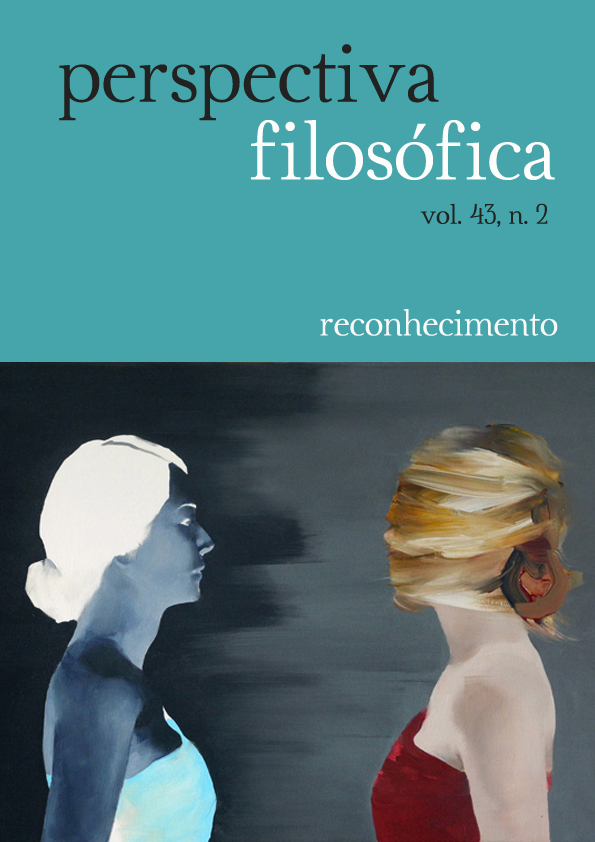Reconhecimento ideológico e intimidades políticas
Keywords:
ideological recognition, Axel Honneth, theory of recognition, power, ideologyAbstract
This article aims at presenting and questioning the fragilities of the reflections about ideological recognition carried out by the philosopher Axel Honneth, being the main one the negation of the private sphere as a space permeated by power relations. Initially, it will be resumed the theoretical route developed by Honneth to conceive the idea of ideological recognition. Then, it will be presented specific critiques developed by some philosophers towards these Honnethian reflections. In my point of view, the more relevant and forceful one is the critique which points out the depoliticization of the private both in The struggle for recognition and in Recognition ans ideology. When Honneth denies that the private sphere is also permeated by power relations, he makes invisible experiences of recognition constituted in the private sphere and capable of provoking subjection, domination, coercion and submission, for example. Approaching private sphere in its political complexity is, therefore, the way that should be walked by a critical theory whose main goal is illuminating the most variagated shades of social experiences of suffering.
References
ALLEN, Amy. The end of progress: decolonizing the normative foundations of critical theory. New York: Columbia University Press, 2016.
ALLEN, Amy. Recognizing domination: recognition and power in Honneth’s critical theory. Journal of Power, v. 3, n. 1, p; 21-23, 2010.
BUTLER, Judith. The psychic life of power: theories in subjection. Stanford: Stanford University Press, 1997.
CELIKATES, Robin. O não reconhecimento sistemático e a prática da crítica: Bourdieu, Boltanski e o papel da teoria crítica. Novos Estudos, n. 93, jul. 2012.
CONNOLLY, Julie. Love in the private: Axel Honneth, feminism and the politics of recognition. Contemporary political theory, v. 9, n. 4, p. 414-433, 2010.
FERRARESE, Estelle. “Gabba-Gabba, we accept you, one of us”: vulnerability and power in the relationship of recognition. Constellations, v. 16, n. 4, p. 604-614, 2009.
HONNETH, Axel. Reconhecimento como ideologia: sobre a correlação entre moral e poder. Revista Fevereiro, n. 7, 2014.
HONNETH, Axel; BUTLER, Judith; GEUSS, Raymond; LEAR, Jonathan. Reification: A New Look At An Old Idea. New York: Oxford University Press, 2008.
HONNETH, Axel. Luta por reconhecimento: a gramática moral dos conflitos sociais. São Paulo: Editora 34, 2003.
HONNETH, Axel. Organized self-realization: some paradoxes of individualization. European Journal of Social Theory, v. 7, n. 4, p. 463-478, 2004.
JAEGGI, Rahel. Repensando a ideologia. Civitas, v. 8, n. 1, p. 137-165, 2008.
MUSSNICH, Luiza. Quer trabalhar na Vogue? Então vem ver essas dicas aqui! Vogue Brasil, 21 de outubro de 2016. Disponível em: < http://vogue.globo.com/lifestyle/noticia/2016/10/quer-trabalhar-na-vogue-entao-vem-ver-essas-dicas-aqui.html>. Acesso em: 02 de novembro de 2016.
PETHERBRIDGE, Danielle. The critical theory of Axel Honneth. Plymouth: Lexington Books, 2013.
REPA, Luiz Sérgio. Reconstrução e crítica imanente: Rahel Jaeggi e a recusa do método reconstrutivo na Teoria Crítica. Cadernos de Filosofia Alemã, v. 21, n. 1, p. 13-27, 2016.
SCHAUB, Jörg. Misdevelopments, pathologies and normative revolutions: normative reconstruction as method of critical theory. Critical Horizons, v. 16, n. 2, p. 107-130, 2015.
Downloads
Published
Issue
Section
License
A Revista Perspectiva Filosófica orienta seus procedimentos de gestão de artigos conforme as diretrizes básicas formuladas pelo Conselho Nacional de Desenvolvimento Científico e Tecnológico (CNPq). http://www.cnpq.br/web/guest/diretrizesAutores que publicam nesta revista concordam com os seguintes termos:
Os autores mantém os direitos autorais e concedem à revista o direito de primeira publicação, sendo o trabalho simultaneamente licenciado sob https://creativecommons.org/licenses/by/4.0/deed.pt_BR que permite o compartilhamento do trabalho com reconhecimento da autoria e publicação inicial nesta revista.
Os autores têm autorização para assumir contratos adicionais separadamente, para distribuição não-exclusiva da versão do trabalho publicada nesta revista, com reconhecimento de autoria e publicação inicial nesta revista (Consultar http://opcit.eprints.org/oacitation-biblio.html).

Esta revista está licenciada com uma Licença Creative Commons Atribuição 4.0 Internacional.













